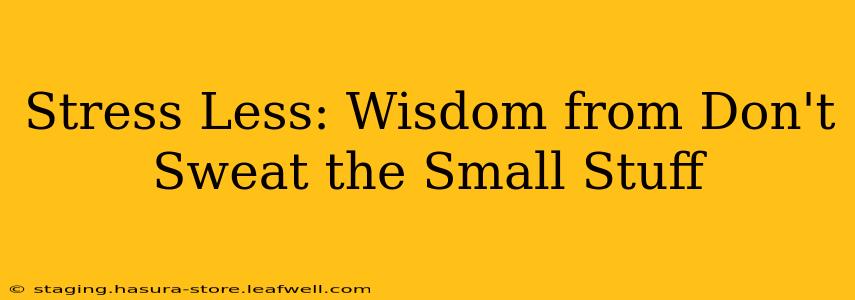We all experience stress. It's a part of life. But when stress becomes overwhelming, it impacts our physical and mental health. Richard Carlson's seminal work, Don't Sweat the Small Stuff, offers a powerful philosophy for navigating the daily anxieties that plague us. This post will delve into the core tenets of his approach, exploring practical strategies to reduce stress and cultivate a more peaceful life. We'll also address some frequently asked questions surrounding stress management.
What is the main idea of Don't Sweat the Small Stuff?
The central message of Don't Sweat the Small Stuff revolves around prioritizing what truly matters. Carlson argues that we spend an inordinate amount of time and energy worrying about relatively insignificant things – "small stuff" – that ultimately have little impact on our long-term happiness or well-being. By consciously choosing to let go of these minor frustrations and focusing our energy on what is truly important, we can significantly reduce stress and improve our quality of life. This involves cultivating a mindful and appreciative perspective, rather than getting bogged down in negativity and anxiety.
How can I apply the principles of Don't Sweat the Small Stuff to my daily life?
Applying Carlson's principles requires a conscious effort and ongoing practice. Here are some practical steps:
- Identify your stressors: Begin by identifying the specific situations, thoughts, or people that trigger your stress response. Keeping a journal can be helpful in this process.
- Challenge your thinking: Once you've identified your stressors, question the validity of your reactions. Are you exaggerating the significance of the situation? Are your expectations realistic? Often, our stress stems from unrealistic expectations or catastrophic thinking.
- Practice mindfulness: Mindfulness techniques, such as meditation or deep breathing, can help you stay grounded in the present moment and reduce the power of negative thoughts.
- Prioritize tasks: Focus on completing the most important tasks first. This helps you manage your time effectively and avoid feeling overwhelmed.
- Learn to say no: Overcommitting yourself is a major source of stress. Learn to politely decline requests that you don't have the time or energy for.
- Forgive yourself and others: Holding onto grudges and resentment only adds to your stress load. Practice forgiveness, both of yourself and others.
- Seek support: Don't be afraid to reach out to friends, family, or a therapist for support when needed.
What are some examples of "small stuff" to let go of?
Examples of "small stuff" abound in daily life. Consider these:
- Traffic jams: Getting stuck in traffic is frustrating, but it's usually temporary. Use the time to listen to music or a podcast.
- Rude people: While encountering rudeness is unpleasant, you can't control other people's behavior. Choose to let it go and focus on your own actions.
- Minor inconveniences: Spilled coffee, a missed train – these are minor setbacks. Don't let them ruin your day.
- Unrealistic expectations: Don't strive for perfection. Accept that mistakes happen and learn from them.
Does Don't Sweat the Small Stuff work for everyone?
While the principles in Don't Sweat the Small Stuff are widely applicable, individual experiences and responses to stress vary. What constitutes "small stuff" for one person may be a significant stressor for another. The effectiveness of Carlson's approach depends on individual commitment to practicing the techniques and adapting them to their unique circumstances. For individuals with severe anxiety or other mental health conditions, professional guidance is crucial. The book offers a framework, but it's not a substitute for professional help when needed.
What are some other books or resources on stress management?
Many resources are available to help manage stress, beyond Don't Sweat the Small Stuff. Exploring mindfulness techniques, cognitive behavioral therapy (CBT) resources, and other self-help books on stress management can provide further support.
Conclusion: Finding Peace in the Everyday
Don't Sweat the Small Stuff provides a powerful and practical framework for reducing stress and improving overall well-being. By consciously choosing to focus on what truly matters and letting go of minor frustrations, we can create a more peaceful and fulfilling life. Remember that consistent effort and self-compassion are key to successfully applying these principles. This journey towards stress reduction is a personal one, and seeking professional help when necessary is a sign of strength, not weakness.

